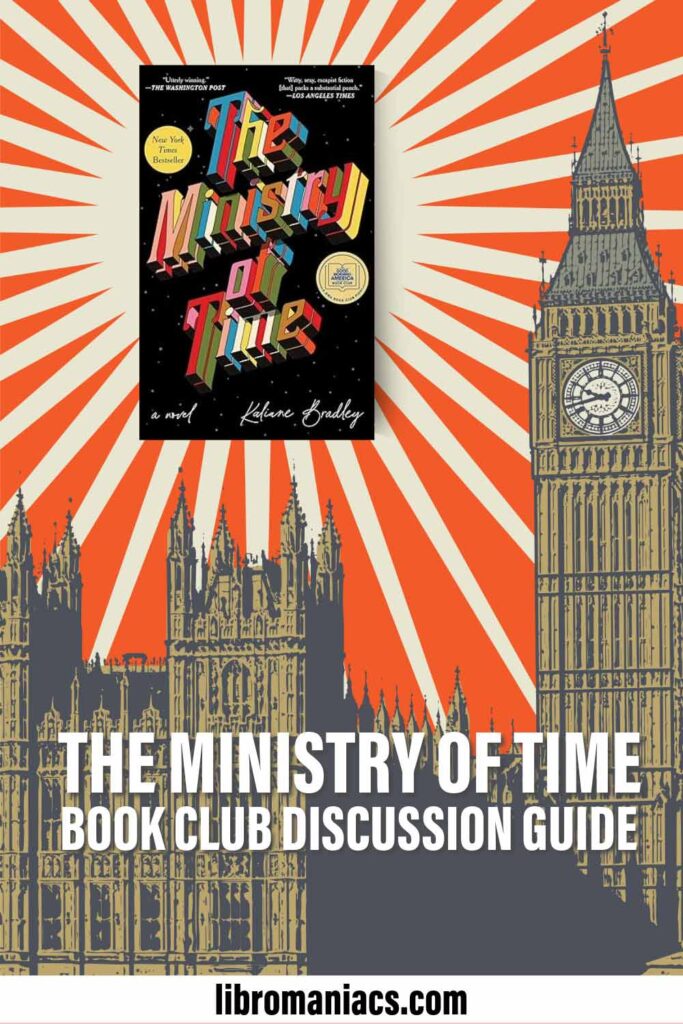Is it a Rom Com? Is it a time travel thriller? Is it a cautionary tale about what happens when you don’t sufficiently question authority? Is it a fish out of water story? Or a trauma story?
Yes, The Ministry of Time is all that. And whether you thought it was more of one thing than another is the very sort of thing that could occupy a good chunk of your book club discussion. This book covers themes of displacement, desperation, unintended (and intended) consequences and why chicken purses are cute but impractical.
We’ll help you get the conversation going with this The Ministry of Time discussion guide. To start, we’ve got a synopsis, 10 book club questions for The Ministry of Time, and a handful of interesting (and wildly divergent) reviews. And if you loved it and want more, we’ve also got some related reads at the bottom of the page.
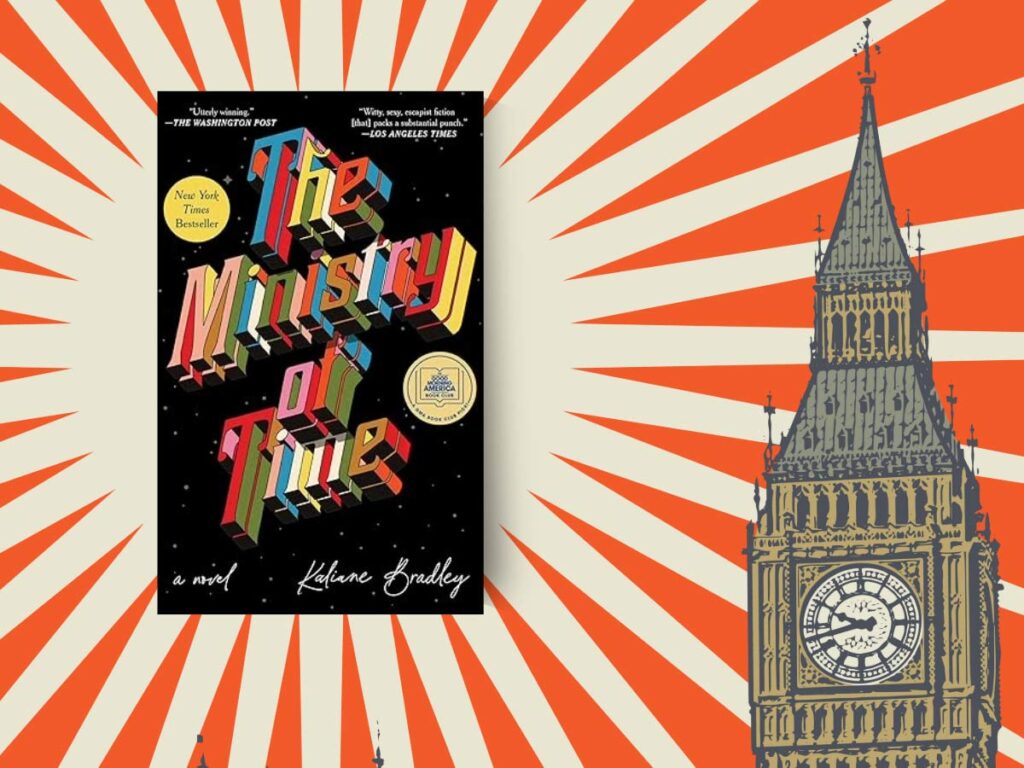
(This article contains affiliate links. This means that if you choose to purchase, I’ll make a small commission.)
The Ministry of Time, Kaliane Bradley
(We always chose to provide the publisher synopsis because we feel that it’s worthwhile to discuss whether the official book description actually squared with your experience of the book.)
In the near future, a civil servant is offered the salary of her dreams and is, shortly afterward, told what project she’ll be working on. A recently established government ministry is gathering “expats” from across history to establish whether time travel is feasible—for the body, but also for the fabric of space-time.
She is tasked with working as a “bridge”: living with, assisting, and monitoring the expat known as “1847” or Commander Graham Gore. As far as history is concerned, Commander Gore died on Sir John Franklin’s doomed 1845 expedition to the Arctic, so he’s a little disoriented to be living with an unmarried woman who regularly shows her calves, surrounded by outlandish concepts such as “washing machines,” “Spotify,” and “the collapse of the British Empire.” But with an appetite for discovery, a seven-a-day cigarette habit, and the support of a charming and chaotic cast of fellow expats, he soon adjusts.
Over the next year, what the bridge initially thought would be, at best, a horrifically uncomfortable roommate dynamic, evolves into something much deeper. By the time the true shape of the Ministry’s project comes to light, the bridge has fallen haphazardly, fervently in love, with consequences she never could have imagined. Forced to confront the choices that brought them together, the bridge must finally reckon with how—and whether she believes—what she does next can change the future.
An exquisitely original and feverishly fun fusion of genres and ideas, The Ministry of Time asks: What does it mean to defy history, when history is living in your house? Kaliane Bradley’s answer is a blazing, unforgettable testament to what we owe each other in a changing world.
10 Book Club Questions for The Ministry of Time
- The narrator is only ever called the Bridge. Everyone else has a name but she doesn’t. Did you notice? And if so, how did it affect your perception of the character?
- While the Bridge was being interviewed for the job, the interviewer said “…you don’t look Cambodian”, to which the Bridge writes, “People say this to me a lot, and what they mean is: you look like one of the late-entering forms of white—Spanish maybe—and also like you’re not dragging a genocide around, which is good because that sort of thing makes people uncomfortable.”
How does her Cambodian heritage play into the narrative? - The Bridge’s mother was a Cambodian refugee, although the narrator notes that her mother would not have referred to herself that way. And the time travelers were variously called expats or refugees. Expat, refugee, asylum seekers, strangers in a strange land: how would you define these terms. And how would you apply them to the characters of the novel?
- The book was written in a very light tone, but it tackles some dark subject matter. Discuss those contrasts. Did the book strike the right balance?
- That lighter tone is particularly fun when the expats are fumbling around trying to make sense of modern culture. Or when they bring their own culture or vernacular into the modern day, such as Martha’s colorful colloquialisms : Pizzle-headed doorknob, Heron-faced fool, His face is as soiled linens!
What were some of your favorite fish out of water moments?
- The author said that she included the Franklin passages, because she was interested in the expedition, but also to underscore British Colonialism, the emotional life of the expedition and to explain how Graham’s trauma has shaped him. Discuss how the passages did (or didn’t) help you understand Graham as a character.
- There you were, going merrily along thinking this was a time travel Rom Com, and then the foreshadowing starts, concluding with the realization that our narrator has written this account as a letter of caution to herself.
“This is how you change history. As far as you know—or as far as the you that is me knows—the time-door is broken. You may never receive this document, which tells you what you will become if you follow this version of yourself.”
Discuss this twist. Did you perceive the book as simply a first person narrative? Did you realize that she was her own intended audience for the narrative? - Early in the book the Bridge says “Assimilate” is actually the word we used—they would assimilate if they said “phone” instead of “unholy device” or “car” instead of “horseless carriage”—but we meant survive.” What’s the difference between assimilation and survival? Have you ever been so out of place that you flipped from assimilation to survival mode?
- The Bridge tells us, “Life is a series of slamming doors. We make irrevocable decisions every day. A twelve-second delay, a slip of the tongue, and suddenly your life is on a new road.” Do you believe that to be true?
- Stick with me here, because this one gets convoluted. Even as the book was being published, the BBC purchased rights and started planning a series. The BBC was promptly accused of plagiarism, because there is also a Spanish TV series of the same name (El Ministerio del Tiempo). Mind you, the book had not yet been published and the series had not launched. In response, some outraged Goodreads reviewers launched a campaign to bomb the book with 1-star reviews, again, before it was even published. You can see one of those reviews here, along with responses to the review.
This sort of activist review-bombing has started happening more frequently. How do you feel about the practice? Is it fair to the author? Is it an appropriate venue for protesting an author or an individual work? What, if anything, should Goodreads be doing about it?
Selected Reviews for The Ministry of Time
(Use these selected Goodreads reviews to compare with your own experience of the book. Do you agree or disagree with the reviews?)
“The characters behaved like their timeframe and were very well developed. They had idiosyncrasies and personalities…their needs and wants were realistic. This is a wonderfully well-plotted book. I can imagine the author with lots of Post-it notes all over a storyboard trying to keep everything together in their proper order and timeline. Her world-building style made it so easy to read and imagine.”
“[…] if the author had told me she and her friends came up with this idea during a pub crawl that, after consuming several alcohol containing beverages, led to a wild round of the Wiki Game until one of them stumbled upon Graham Gore’s entry only to read that he was an English naval officer who supposedly died during an Arctic expedition in the 1850s, I would have believed her, no questions asked.”
“QUICK TAKE: the closest thing to OUTLANDER I’ve read since…OUTLANDER. Romantic, twisty, very entertaining.”
“Billed as ‘a time-toying spy romance’ by Kirkus, this ‘genre-bending’ novel reads more like slice of life with speculative elements that, unfortunately, never feel fully developed or satisfying […] “The contrast of our MC and her ward could have been used to dive into the themes she lightly touches on already: history, colonialism, gender, etc. Or it could’ve been more focused on the sci-fi speculative nature of the time travel bits which didn’t get enough explanation to make much sense. Confoundingly, this also had some romance in it (one surprisingly spicy scene) which I suppose could’ve been its own story if that is where the author wanted to take it. Instead, the book tries to do all of the above in a short amount of time, and I felt it lacked because of this ambition.”
3 Books Like The Ministry of Time
This book was chosen for the Good Morning America book club. If you like their vibes, we also have guide for: The Frozen River, Pineapple Street, The Violin Conspiracy, Mad Honey, Lessons in Chemistry, The Lions of Fifth Avenue, and The Personal Librarian.
Each discussion guide has a non-spoiler synopsis toward the top of the article.
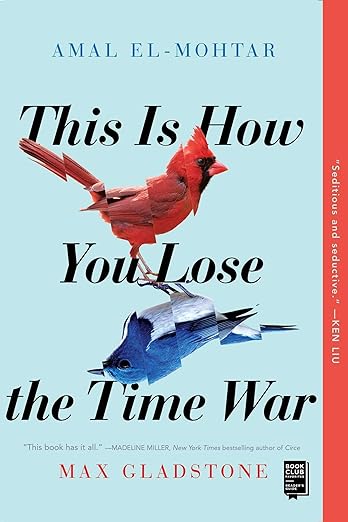
This is How You Lose the Time War, Amal El-Mohtar and Max Gladstone
Like in The Ministry of Time, this future isn’t looking great and factions are warring, using time travel to try to gain themselves the benefit of a better future. Two rival agents in the fight, begin a correspondence that turns into a romance and an exploration of self-discovery.
The book’s format takes an epistolary form with each author taking on one of the characters.
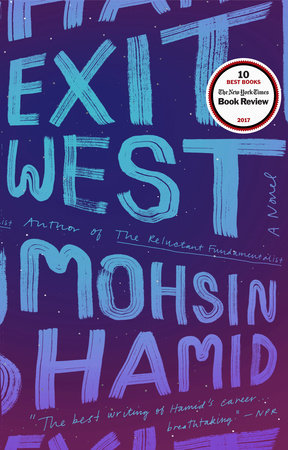
Exit West, Mohsin Hamad
This book was my favorite in the year that I read it. It keys in on the experience of refugees and their struggle to make a life amidst displacement. Nadia and Saeed’s city, a proxy for Cairo, is convulsing with civil war. As things get more dangerous, they make a plan to escape together.
They hear rumors about special doors that, once stepped through, can whisk you away from the danger. But where to? Is it safe? Will they be accepted in the new place?
This spec-fic book has a tender take on young romance and poses some very thoughtful questions about what happens to refugees when they leave…and what happens to the cultures into which they flee.
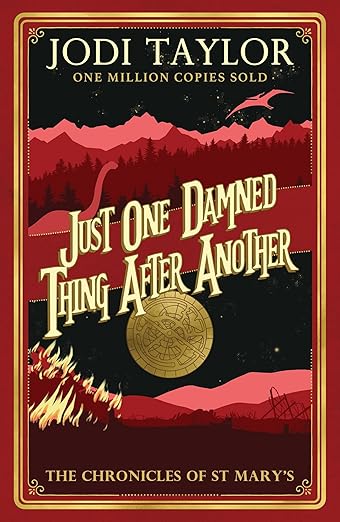
Just One Damned Thing After Another, Jodi Taylor
(Chronicles of St. Mary’s #1)
This group of time-traveling historians are just supposed to observe history unfolding…and report back to Saint Mary’s. But as Max soon finds out, things don’t always go according to plan.
This is a run romp if you want more time-travel and liked the element of actual historical figures.
Share these book club questions for The Ministry of Time with your friends:
